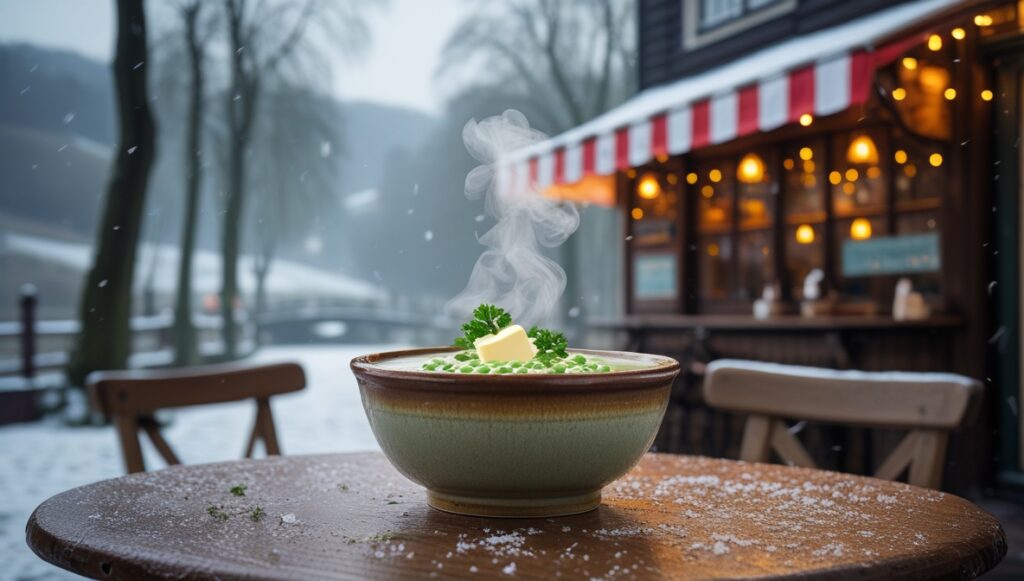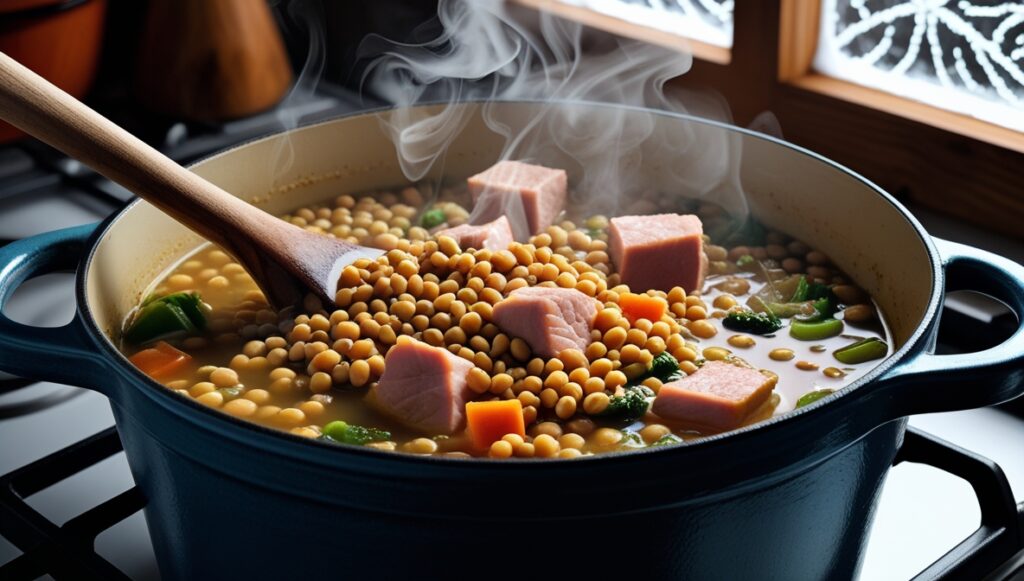Introduction
Warm, thick, and soul-satisfying, Erwtensoep (also known as snert) is a beloved Dutch winter classic. This split pea soup is more than just a comfort dish—it’s a cultural staple deeply woven into Dutch heritage. Served hot on icy days and often enjoyed after ice skating, Erwtensoep is a culinary hug that embodies the spirit of the Netherlands.
So why is it so loved? Its rich, smoky flavor, hearty texture, and warming qualities make it a cold-weather favorite. It’s not just a dish—it’s a tradition.


History & Cultural Significance
Erwtensoep has been part of Dutch cuisine for centuries, with recipes dating back to the 16th century. It originated as a peasants’ meal, made from accessible and affordable ingredients like split peas, vegetables, and pork. Its thick consistency made it perfect for feeding families during the harsh Dutch winters.
The dish holds a cultural status in the Netherlands, especially during winter festivals and New Year’s celebrations. It’s also traditionally served on “Elfstedentocht” days—the famous ice-skating tour through Friesland—where stalls dish out steaming bowls to skaters and spectators.
Ingredients & Regional Variations
Key Ingredients:
Split green peas
Pork (smoked sausage, bacon, pork ribs, or hock)
Potatoes
Carrots
Leeks
Celeriac (or celery root)
Onions
Seasonings (salt, pepper, bay leaves, thyme)
Regional Variations:
Frisian-style Erwtensoep may include rye bread (roggebrood) and bacon as accompaniments.
Some regions incorporate smoked eel or different root vegetables.
Modern & International Adaptations:
Vegetarian and vegan versions use smoked tofu or liquid smoke.
Some modern takes add chili flakes or turmeric for a twist.
In fusion kitchens, it’s sometimes served with naan or crusty sourdough instead of traditional rye.
Cooking Process & Difficulty Level

Difficulty Level: Beginner to Intermediate
This is a one-pot recipe, but it takes time and patience to build flavor.
Basic Cooking Steps:
Soak split peas (optional for faster cooking).
In a large pot, simmer peas with pork, bay leaves, and water or broth.
Add chopped vegetables (carrots, leeks, potatoes, celeriac, onion).
Let it cook for 1.5 to 2 hours until thick and creamy.
Add sliced rookworst (Dutch smoked sausage) toward the end.
Season to taste. Let rest—Erwtensoep is often better the next day!
Pro Tip: Let it cool and reheat—it thickens overnight and becomes even tastier.
Where to Eat Erwtensoep in Netherlands
Famous Spots:
Café de Klos (Amsterdam) – Known for hearty Dutch classics.
Vleminckx Sausmeesters (Amsterdam) – A street food gem serving Erwtensoep in winter.
Stamppotje (Utrecht) – A great stop for traditional Dutch comfort food.
Moeders (Amsterdam) – A cozy restaurant celebrating Dutch “mom’s recipes.”
Hidden Gems:
Friesland Winter Stalls – Try Erwtensoep during the Elfstedentocht season.
Local Christmas Markets – Almost every winter market will have a vendor ladling snert into warm cups.
Pairing with Drinks & Side Dishes
Best Pairings:
Roggebrood (dark rye bread) with butter and katenspek (cured pork belly)
Crusty bread or cheese-topped toast for dipping
Drinks:
Dark beer (Dubbel or Bock) – complements the smoky, hearty soup
Herbal tea like rooibos or chamomile
Apple cider or even a spiced mulled wine in colder months
Fun Facts & Lesser-Known Trivia
The Dutch say, “Erwtensoep moet je kunnen snijden” – “You should be able to cut Erwtensoep with a knife,” referring to its signature thickness.
In Friesland, it’s often eaten during ice-skating marathons.
Erwtensoep has been compared to the French soupe aux pois, but with a richer texture and more meat.
Health Benefits & Nutrition
Nutritional Value:
High in protein from split peas and pork
Rich in fiber, aiding digestion
Contains iron, magnesium, and B vitamins
Dietary Alternatives:
Vegan: Use veggie broth, smoked tofu, and lentils
Gluten-free: Naturally GF, just check sausage ingredients
Low-carb/keto: Hard to adapt fully due to peas, but a moderate version is possible with substitutions
How to Cook It at Home (Best Erwtensoep Recipe)
Ingredients:
300g dried split peas
1 smoked sausage (rookworst)
150g pork ribs or hock (optional)
1 leek, sliced
2 carrots, diced
2 potatoes, cubed
1/2 celeriac, cubed
1 onion, chopped
2 bay leaves
Salt, pepper, thyme
2 liters water or broth
Instructions:
Rinse the split peas and place them in a large pot with pork and water/broth.
Add bay leaves and bring to a boil. Simmer for 45 minutes.
Add vegetables and simmer another 45 minutes.
Stir occasionally to break down the peas.
Add sliced rookworst in the last 15 minutes.
Remove bay leaves. Taste and adjust seasoning.
Let it rest before serving—it’s even better the next day!
Tips:
For depth, add a dash of smoked paprika.
Freeze leftovers—it stores well!
Global Influence & Fusion Cuisine
Erwtensoep has made appearances in Dutch-American communities in the U.S. and Canada.
It inspired German Erbsensuppe and is often seen in winter stew collections worldwide.
Chefs have used it as a base for risotto or served it deconstructed in gourmet form.
Comparison with Similar Dishes
Erwtensoep (Netherlands)
Thick, hearty split pea soup
Includes pork (ribs, hock) and Dutch smoked sausage (rookworst)
Contains root vegetables like carrots, celeriac, and potatoes
Traditionally served with rye bread (roggebrood)
Extremely thick—almost stew-like
Erbsensuppe (Germany)
Similar split pea base
Often includes frankfurters or other smoked sausages
May have added mustard or vinegar for tanginess
Texture is less thick than Erwtensoep
Popular in German army field kitchens and Oktoberfest events
Potage Saint-Germain (France)
Elegant, creamy green pea soup
Made with fresh peas, butter, leeks, and herbs
Often pureed and strained for smooth texture
Served in fine dining as a starter
Lighter and more refined than Erwtensoep
American Split Pea Soup
Split peas with ham or smoked ham hock
Includes carrots, onions, and celery
Thinner consistency than Dutch version
Often seasoned with thyme and bay leaf
Commonly served with crackers or crusty bread
British Pea & Ham Soup
Similar to American version
May use garden peas instead of split peas
Includes diced ham and sometimes mint
Lighter flavor profile and smoother texture
Served as a starter in pubs or homes

